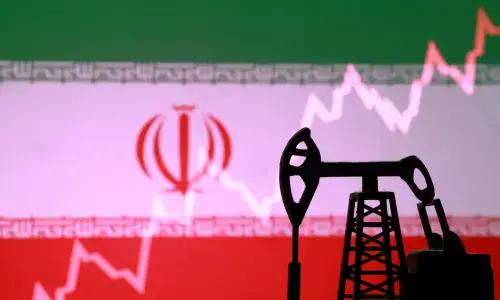 |
A complete hotchpotch
The movie’s chief protagonist – the underworld hero, Aslam bhai – is played by Aslam Bhatti who is also the producer and co-distributor of the film.
The plot tells us – in fleeting insights – that he is now a businessman. There is no mention of his trade – just that he is emotionally unstable, but is generally a good natured man who doesn’t have the best of relations with his family in rural Pakistan (they include Mustafa Qureshi and Ahsan Khan, who was rumored as a lead but has well-nigh three minutes of total screen-time).
 |
| A scene from movie, "Saltanat". – Courtesy Photo |
Aslam, though has an empire in the Middle East, chock full of foreign ladies clad in stylish bare-necessities, as is visible in the trailer. Despite this, Aslam never misses ‘Jummah’ prayers – a plot point that gains significance before the movie’s climatic brawl between two underworld factions in a far-off, undisclosed, forest-side location. Like the story-tracks (meaning alternating stories), the locations have little consequence.
Aslam’s wife is Pari (Shweta Tiwari), a good-looking, docile and understanding woman. Aslam, however, had feelings for Tara (Achint Kaur), who obviously shuns them. Aslam proposes to Pari on the turnaround, and she accepts.
 |
| A scene from movie, "Saltanat". – Courtesy Photo |
Meanwhile, Aslam has enemies: a cousin, Sikandar – also a criminal villain, played by Javed Sheikh (with minimal acting) – and Gharou Dollar (Govind Namdev), a money forger whose “counterfeit are so real that real money looks mock in comparison”; or as he says “Dollar naqli chapta hoon, par baat asli karta hoon [I may forge currencies, but I speak honestly]".
It seems like Sikandar and Dollar have nothing else to do other than plot Aslam’s demise, or set-about some manner of emotional trauma. One of their backfired strategies involves an inter-family marriage between Sikandar’s son and Aslam's younger sister Zainab (played by Zainab Qayyum – or ZQ), which results in a wrecked engagement ceremony, a bloody head on a plate and smashed champagne bottles.
 |
| A scene from movie, "Saltanat". – Courtesy Photo |
Sikandar and Dollar find a deranged associate (Akashdeep Saigal, the movie’s hammiest performer), whose older brother (Puneet Issar), also an underworld don, is brutally beaten by Aslam. Their clash – involving Salman Khan-style wire-works and slow-motion – is Saltanat’s only viable action scene.
Tara, meanwhile, is working against everyone as an agent of TSI – Thai Special Investigation (the building sign is badly done in unconvincing blue text, like a make-believe architectural add-on). How she investigates is a mystery – the department’s personnel have paperback novels lined up in their work cubicles, so that tells a lot of their dedication to work.
 |
| A scene from movie, "Saltanat". – Courtesy Photo |
In one scene Tara warns a monk of his safety – presumably he’s a witness of the state. The monk, trained with Shaolin Kung Fu skills, is soon assassinated by Sikandar’s hit-men in a badly shot, amateur action sequence.
Technicalities aside – literally
Bukhari, who previously directed Bhai Log (also a movie fixated on underworld criminals produced by Bhatti), is experienced in cinematography – or so I’ve heard. Unfortunately, Saltanat is a perpetual bad day in the craft.
The movie – conceptualised as a 30 episode serial and a motion picture – mixes different video formats together that ends in a confusing result. Almost fifty percent of the footage, haphazardly edited by Z.A Zulfi, Najeeb Khan and Adeel Pk to create ANY narrative semblance, is uprezzed in post – without professional transcoding. The film format is 2048 pixels across; the DV format, found in quite a few scenes including one with Ayub Khooso, is captured in 720 pixels and high definition footage is 1280 and 1920 pixels; the difference is apparent.
 |
| A scene from movie, "Saltanat". – Courtesy Photo |
Moreover, scenes are badly lit from one or two light sources; faces and highlights are blown-out (the white of the image is too bright, clipping out details); and there are focus issues. One early scene with Javed Sheikh and Govind Namdev pulls focus from one character to another, making the distance between the two negligible. Also, the lens is inappropriate, so the encompassing effect makes the whole scene look ‘soft’.
Costume design for half the movie is limited to what the actors wore to set; make-up is unflattering (again what the actor’s probably put on themselves) or had mismatching make-up products; most sets are, I presume, what Bhatti’s endeavors provided for production – at least, they had some saving grace, but then again, they were amateurishly decorated.
Audio and dubbing were misaligned, or dubbed over, in some scenes; some had on-location sound with audio leveling inconsistencies (and echo) – as if the actors weren’t available for dialogue editing sessions.
Acting: Better fit for TV
Bhatti, who plays the lead, interestingly has more than adequate screen-presence. His Aslam exudes the manic bad-guy persona with ease. His character would have been the powerhouse he is claimed to be, but right now he walks around with his pet cheetah, appears in a song or three, and guns down baddies when he’s pissed.
 |
| A scene from movie, "Saltanat". – Courtesy Photo |
Tiwari handles herself with relative ease, so does ZQ, Achnit Kaur and Chetan Hansraj.
Govind Namdev, Puneet Issar and Deepak Shirke play variations of people they’ve done endlessly, hence their on-screen villainy comes off without a hitch. Javed Sheikh, although experienced, is limited by what he is allowed to perform, so his handicap is the script’s pages he’s handed on set.
Akashdeep Saigal, however, is Saltanat’s most unwise casting decision. The way he quivers, shakes, and rattles his body in moments of anger, distress or general dialogue delivery, looks like he’s convulsing in 104 fever.
 |
| A scene from movie, "Saltanat". – Courtesy Photo |
Saigal should take pointers from the foreign dancer promiscuously performing the remix of 'Sone Di Tawatri' – she is, at the very least, trying to lip-synch her lyrics.
The songs by Sajid Hussain, however, were better than expected.
Narrative: Assembled to fit
Saltanat is a curious byproduct. It is perplexing and overshot, almost as if Bukhari had no idea of whether he wanted to make a motion picture leading into a serial or a serial intermixed within a motion picture – I have no idea how the latter is pulled off, even in concept.
It was clearly a bad decision to conceptualise a 400 to 500 scenes narrative into an 80-scene motion picture. The result ended up taking a lopsided shape. Also, their drag-and-drop layout is as befuddling as it is ludicrous.
 |
| A scene from movie, "Saltanat". – Courtesy Photo |
The film looks like an afterthought, left to be pieced together in the edit bay. If Bukhari had a better handle on his subject and chose to shoot just a motion picture, and then a serial, the narrative and the characters living inside this Saltanat would have been gratifying – and perhaps, relatable.
The final word
Definitely not a good way to spend your Eid day – or any other day for that matter.
Distributed by ARY Films; Directed by Syed Faisal Bukhari; Produced by Aslam Bhatti; Screenplay by Pervaiz Kaleem; Edited by Z.A Zulfi, Najeeb Khan, Adeel Pk; Music by Sajid Hussain.
‘Saltanat’ stars: Aslam Bhatti, Mustafa Qureshi, Javed Sheikh, Zainab Qayyum, (a totally wasted) Nayyar Ejaz and Ahsan Khan, Deepak Shirke, Akashdeep Saigal, Shweta Tiwari, Achint Kaur, Chetan Hansraj, Govind Namdev, Puneet Issar and Sila Hussein and Sara Loren in item numbers.






























